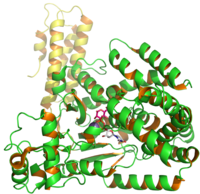
Photo from wikipedia
Clostridium difficile infection causes antibiotics-associated diarrhea and pseudomembranous colitis. Major virulence factors of C. difficile are the Rho-glucosylating toxins TcdA and TcdB. In addition, many, so-called hypervirulent C. difficile strains produce the… Click to show full abstract
Clostridium difficile infection causes antibiotics-associated diarrhea and pseudomembranous colitis. Major virulence factors of C. difficile are the Rho-glucosylating toxins TcdA and TcdB. In addition, many, so-called hypervirulent C. difficile strains produce the binary actin-ADP-ribosylating toxin CDT. CDT causes depolymerization of F-actin and rearrangement of the actin cytoskeleton. Thereby, many cellular functions, which depend on actin, are altered. CDT disturbs the dynamic balance between actin and microtubules in target cells. The toxin increases microtubule polymerization and induces the formation of microtubule-based protrusions at the plasma membrane of target cells. Moreover, CDT causes a redistribution of vesicles from the basolateral side to the apical side, where extracellular matrix proteins are released. These processes may increase the adherence of clostridia to target cells. Here, we review the effects of the action of CDT on the actin cytoskeleton and on the microtubule system.
Journal Title: Anaerobe
Year Published: 2018
Link to full text (if available)
Share on Social Media: Sign Up to like & get
recommendations!